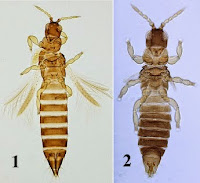Thrips (the word is both singular and plural),Thripidae, are very
small Insects with wings reduced to feathery growths (though this is sufficient
to support them in flying due to their small size). They feed by sucking fluids
from plants, and as such are important agricultural pests, both for their
ability to damage plants directly and their ability to act as a vector for
plant pathogens.
In a paper published in the journal Halteres on 5 March 2015, Kaomud Tyagi
and Vikas Kumar of the Centre for DNA Taxonomy at the Zoological Survey of India describe the discovery of four specimens of the Western Flower Thrips, Frankliniella occidentalis, from a Tomato
plantation at Bangalore in Karnataka State.
Western Flower Thrips, Frankliniella occidentalis, female specimen in dorsal view.
Tyagi& Kumar (2015).
The Western Flower Thrips is known to be a vector of Tospoviruses, a
group of highly pathogenic plant viruses which cause a number of serious crop
diseases. To date fourteen species of Thrips have been demonstrated to carry
Topoviruses, and the Western Flower Thrips is known to carry at least five
different members of the group, including the Tomato spotted wilt virus, which
is estimated to have caused over a billion dollars worth of damage to Tomato
crops around the globe in the early 1990s. To make matters worse, unlike many
Insects which feed by sucking fluids from plants, the Western Flower Thripsis
capable of feeding from a wide variety of plants, and therefore very hard to
eradicate once it becomes established as it quickly builds up a reserve
population in wild plants unaffected by eradication measures in crop fields. As
such the discovery of the species in India is a matter of serious
concern.
See also….
 Fossil Thrips from the Early Eocene of France. Thrips (the term is both singular and plural) are tiny (usually less
than 1 mm) Insects related to Lice and True Bugs. They have wings, but
are poor flyers, and feed by sucking fluids from plant or animal hosts.
Thrips do not undergo metamorphosis, the young...
Fossil Thrips from the Early Eocene of France. Thrips (the term is both singular and plural) are tiny (usually less
than 1 mm) Insects related to Lice and True Bugs. They have wings, but
are poor flyers, and feed by sucking fluids from plant or animal hosts.
Thrips do not undergo metamorphosis, the young... Three new species of Thrips from Japan, Malaysia and Australia. Thrips (the term is both singular and plural) are tiny (usually less
than 1 mm) Insects related to Lice and True Bugs. They have wings, but
are poor flyers, and feed by sucking fluids from plant or animal hosts.
Thrips do not undergo metamorphosis, the young are essentially smaller,
non-reproducing versions of...
Three new species of Thrips from Japan, Malaysia and Australia. Thrips (the term is both singular and plural) are tiny (usually less
than 1 mm) Insects related to Lice and True Bugs. They have wings, but
are poor flyers, and feed by sucking fluids from plant or animal hosts.
Thrips do not undergo metamorphosis, the young are essentially smaller,
non-reproducing versions of... Four new species of Thrips from China, Taiwan, Indonesia, Papua New Guinea and Australia. Thrips (the term is both singular and plural) are tiny (usually less
than 1 mm) Insects related to Lice and True Bugs. They have wings, but
are poor flyers...
Four new species of Thrips from China, Taiwan, Indonesia, Papua New Guinea and Australia. Thrips (the term is both singular and plural) are tiny (usually less
than 1 mm) Insects related to Lice and True Bugs. They have wings, but
are poor flyers...
Follow Sciency Thoughts on Facebook.

